
Vyasa Puja Birthday Celebration of H.H. Satsvarupa dasa Goswami
Stuyvesant Falls Fire Department upstairs banquet hall 9 Firehouse Ln, Stuyvesant Falls, NY 12174
The Stuyvesant Falls Fire Department is located directly behind the Viraha Bhavan ashram buildings. The parking is the same as you would park when visiting Viraha Bhavan (909 Albany Avenue)
10:00 – 10:30 A.M. Kirtana
10:30 – 11:15 A.M. Presentation by Satsvarupa Maharaja
11:15 – 12:30 P.M. Book Table
12:30 – 1:15 P.M. Arati and kirtana
1:15 — 2:15 P.M. Prasadam Feast
Baladeva Vidyabhusana at [email protected] or (518) 754-1108
Krsna dasi at [email protected] or (518) 822-7636
“I request as many devotees as possible to attend so we can feel the family spirit strongly. I become very satisfied when we are all gathered together.”
******
“In the association of pure devotees, discussion of the pastimes and activities of the Supreme Personality of Godhead is very pleasing and satisfying to the ear and the heart. By cultivating such knowledge one gradually becomes advanced on the path of liberation, and thereafter he is freed, and his attraction becomes fixed. Then real devotion and devotional service begin.”
“The process of advancing in Kṛṣṇa consciousness and devotional service is described here. The first point is that one must seek the association of persons who are Kṛṣṇa conscious and who engage in devotional service. Without such association one cannot make advancement. Simply by theoretical knowledge or study one cannot make any appreciable advancement. One must give up the association of materialistic persons and seek the association of devotees because without the association of devotees one cannot understand the activities of the Lord….. One who has firm faith in the Supreme Personality of Godhead becomes fixed, and his attraction for association with the Lord and the devotees increases. Association with devotees means association with the Lord. The devotee who makes this association develops the consciousness for rendering service to the Lord, and then, being situated in the transcendental position of devotional service, he gradually becomes perfect.”
— Srimad-Bhagavatam 3.25.25, verse and purport
Satsvarupa Maharaja’shealth remains relatively stable despite what are becoming regular signs of old age. He get one or two headaches a day, there is swelling in his feet that requires compression socks and water pills. Occasionally there is some disorientation. He pushes on dutifully without any depression or regret, and his writing keeps the GN Press staff totally engaged trying to keep up with book production. His anticipatory anxiety has kicked in since he has been scheduled to do a podcast with Namarasa and Vyenkatta Bhatta in the near future.
Hari Hari,
Baladeva
We need to expand our team of proofreaders as we aim to increase the rate of republication of Satsvarūpa Mahārāja’s books as well as new books that he writes.
This includes a need for fluent bilingual Spanish and English speakers to proofread Spanish translations (we currently have around 20 Spanish translations waiting to be proofread).
Anyone interested in this particular service should contact Manohara dāsa at [email protected]
If you would like to help, please contact Kṛṣṇa-bhajana dāsa at [email protected] or [email protected] and we will find you a service that utilizes your talents.
You know the way to better thinking. I submit to thee, holy name demands—to live with this simple act of chanting and chanting Hare Krsna Hare Krsna Krsna Krsna Hare Hare/Hare Rama Hare Rama, Rama Rama Hare Hare.
******
The morning begins. Turn off the heater. It uses up electricity, money. Now it’s soon time to begin your first chanting of the day, two hours before you use the bathroom. It’s all right, chant faster if you can, but yesterday’s speed was overall okay. No, it was too slow. Eight minutes, forty-five seconds per round is too slow. Speed it up, Prabhu. And gently push out other thoughts. Return to hari-nama. That means you ask Krsna to please work the balm upon your heart. Please reveal to me the will of Krsna in my life. Let me come from this retreat a better man.
******
Manu has a first-class, bound journal. He said he will want to keep it and read it later. Is it not special for me too?
******
Oh, I’ve got no story
and for song a
sing-along melody of
no fur, no spur,
no rankle please.
I live in ISKCON
at ease of retreat where
it’s only chanting all day,
only mantras we pray
Hare Krsna Hare Krsna
through the morning long and short
the effort flows
it’s authorized we suppose,
and encourage each other in
the simple and definite act
recommended by all Vedic
scriptures for this age. As
Haridasa Thakura said, nirantara
nāma lao
always chant God’s
holy names.
And if you’ve offended Him,
then go to Nama
and ask forgiveness.
I did not realize Your super-
excellence, I’m an offender. Please
reinstate me as an atom
at Your lotus feet;
please let me chant in peace and
devotion. Do with me as
You like.
******
Sri-krsna-caitanya prabhu nityananda. Ink flows. This is my only chance in the day for extended writing. Other time it’s all chanting.
******
I look ahead to when I can write at length and ask myself what it will be. But there’s no real conscious planning. I trust that chanting will solve all problems.
******
These days. One already gone. Are just for chanting. The act is to recite and hear the maha-mantra. Even to write about it seems a very separate act. What can we capture in a journal note? The idea is to preserve something to renind us of the good time. All right, granted, it may help.
******
Futile acts. If you try to preserve some false ego. And worries needless. Try to make the world a perfect environment. Futile acts. You sense maybe your writing or reading even can attain a permanent state? Aye, but they’re good for you. What else would you do? You can’t go deep, but keep on chanting these days and you are practicing for the time of death.
******
Going fifty minutes this session. The black ink flows. Now get the tape machine ready to play Srila Prabhupada with japa. Light candles, give Srila Prabhupada his Dictaphone. Turn off most light. Set your stopwatch, beads, glove on right hand. You are off to another day’s quota. Farewell to accompanying yourself with pen. Here comes the battle with the mind for space.
pp. 60-63
There are thousands of “favorite” slokas in the Srimad-Bhagavatam and other Vedic literatures. The selection in this chapter is some of the verses which specifically give me an impetus for prayer.
Let this temporary body be burnt to ashes, and let the air of life be merged with the totality of air. Now, O my Lord, please remember all my sacrifices, and because You are the ultimate beneficiary, please remember all that I have done for You.
O my Lord, as powerful as fire, O omnipotent one, now I offer You all obeisances, falling on the ground at Your feet. O my Lord, please lead me on the right path to reach You, and since You know all that I have done in the past, please free me from the reactions to my past sins so that there will be no hindrance to my progress.
—Isopanisad 17-18
Prabhupada writes,
“This prayer is made at the time of death in full consciousness of one’s past deeds and of the ultimate goal.” This is one particular devotee’s prayer, and yet it is everyone’s prayer.
The devotee is reminding Krsna, “Now that I am about to die, please remember my devotional service.” I take it that this is said not in a demanding way, but in a friendly spirit between servant and master. And after all, death is a fearful moment. The devotee knows that he has done heaps of sinful acts in the past, so he hopes his service will be recalled. Prabhupada says that even if a devotee does not remind Krsna, “The Lord does not forget the devotional service of His devotee.”
There’s a similar statement by Prabhupada in his purport about Gajendra’s prayers:
Only Krsna can deliver us from this material existence. Indeed, He is always trying to deliver us. Isvarah sarva-bhutanam hrd-dese ‘rjuna tisthati. He is within our hearts and is not at all inattentive. His only aim is to deliver us from material life. It is not that He becomes attentive to us only when we offer prayers to Him. Even before we offer our prayers, He incessantly tries to deliver us. He is never lazy in regard to our deliverance.
—Bhag. 8.3.17, purport
Repeatedly the devotee calls on the Lord in a personal way, “O my Lord.” It’s in a tone of awe and reverence, “falling on the ground at Your feet,” but very intense. It’s not just formally offered praise. It is surcharged with the personality of the devotee and his desire for deliverance, but not in a self-centered way. His end has come, and he is ready to surrender; give up the body and life-air, and go to Krsna, “if You will kindly remember me, free me from karma and lead me on the right path to reach You.” He wants to go back to Godhead, beyond birth and death, and he is crying out helplessly and yet courageously, “Please take me, Lord!” It’s a bit reminiscent of Lord Caitanya’s cry,
“O Son of Maharaja Nanda [Krsna] , I am Your eternal servitor, yet somehow or other I have fallen into the ocean of birth and death. Please pick me up from this ocean of death and place me as one of the atoms at Your lotus feet.” (Sri Siksastaka, verse 5)
When you can enter a sastric prayer like this, then you feel no need to add anything of your own. Your own case is completely stated, exactly as you would want to pray, except you don’t have the ability to express yourself. So we are grateful to find slokas like this and make them our own.
Without the Bhaktivedanta purport we really couldn’t do this, couldn’t confidently embrace this sloka knowing that Prabhupada is all for it. So the purport is part of the whole, and it elucidates and enlightens the prayer as when Prabhupada states, “The Lord is addressed as fire because He can burn anything into ashes, including the sins of the surrendered soul.” (Isopanisad 18, purport)
May there be good fortune throughout the universe, and may all envious persons be pacified. May all living entities become calm by practicing bhakti-yoga, for by accepting devotional service they will think of each other’s welfare. Therefore let us all engage in the service of the supreme transcendence, Lord Sri Krsna, and always remain absorbed in thought of Him.
—Bhag. 5.18.9
I like to read this verse to an audience on Christmas. It is like the prayer in St. Luke’s Gospel, “Peace on earth, good will to men.”
It is an ultimate prayer asking the Supreme Lord to give all souls peace, let them accept Krsna consciousness, let even the demons’ hearts be changed. We may feel that it is not possible for us to ask for universal blessings like this, although Prahlada did it. But Prahlada is a mahajana, which means that we should follow his example. There is certainly no harm in our reciting his words and appreciating his compassion, worshiping his prayer. Just by reciting it, we too turn to the Supreme Lord and express what is there in everyone’s heart, although we hardly dare to express it—the desire that everyone be happy and peaceful and that love of God reign everywhere. Maybe it is not possible in Kali-yuga, but we can pray for it. Anything is possible if enough sincere prayers are rendered by surrendered souls.
Prabhupada makes many wonderful statements in his purport which brings out the full beauty of Prahlada’s prayer. He states that a Vaisnava actually can fulfill the desires of anyone (vancha-kalpa-tarubhyas ca), provided that we surrender to Him and take to devotional service. Therefore this is a prayer by a Vaisnava asking the Lord to let people become devotees. Prabhupada writes, “He prays not for himself, but for all living entities—the gentle, the envious and the mischievous.” He doesn’t ask anything for himself, but for his demonic father and for the welfare of the entire universe.
pp. 61-64
I will now tell how a hunter named Mrgari became a great devotee, by the association of Narada Muni. If this meeting did not take place, then there would be no Krsna conscious life story of Visnu-rata. It was Mrgari, after he became a Vaisnava, who became the spiritual master of Visnu-rata.
The story of Narada and Mrgari is told in the oral histories. I cannot improve on that narration, and I assume that my readers have already heard it. But I will retell it here briefly.
One time, the great sage Narada Muni, after visiting Lord Vigtu in Vaikuntha, was going to bathe at Prayaga, in the land of Bharata-varsa. While walking on the forest path, he saw a sight that gave him great pain. A deer with its legs broken was flapping in pain. It had been shot by a hunter, but left half-killed. A little later on the path, Narada saw other animals in this condition. Finally, he saw the culprit, a hunter, hiding behind a tree with a drawn bow.
Narada went up to the hunter, and in so doing, he frightened the animal the hunter was about to kill. The hunter wanted to curse Narada, but by the influence of the saint, he was unable to do so. He asked Narada, “Why have you come off the path and scared my animals away like this?”
Narada asked his own question: “Are you the one who leaves these animals half-killed, flapping in pain?”
The hunter replied, “Yes, I do. What’s wrong with it?”
Narada said, “It is bad enough when you kill animals, but it is much worse when you leave them half-dead, because you inflict greater pain on them. Listen, and please do me a favor.”
The hunter felt charitable in the presence of Narada and wanted to serve him. He said, “Yes, I will do you a favor, whatever you like. Let me give you some skins. I can even give you a deer or tiger skin.”
Narada said, “I am not interested in the skins. But I just want you to promise me that in the future, you will kill the animals. Don’t half-kill them.”
The hunter was astonished, “I don’t understand. My father taught me to do this. When I leave an animal half-flapping in pain it gives me great pleasure, just as it was pleasurable to my father.”
Narada then told him that one who inflicted such pain on animals would have to suffer unlimitedly himself. Narada briefly described the laws of karma: that the very animals the hunter tortured would, in the next life, come back and torture the hunter.
Hearing Narada’s strong presentation, and visualizing how it would happen in the future that the deer would come after him with its antlers, and that the other animals would come after him with various natural weapons to torture him, the hunter became somewhat convinced and fearful of what he was doing. He had never before spoken to a sadhu and become softened toward animals or moral teaching. This was an extraordinary circumstance because Narada is so fully empowered by Lord Narayana. Thus, the hunter, whose name was Mrgari (“the enemy of the beasts”), asked Narada, “How can I be saved from these sinful acts?”
The hunter bowed down before Narada and asked him to please become his guru. Narada’s first instruction was, “Break your bow and then I will tell you what to do.” The hunter hesitated and said frankly that he did not know how he could live unless he used his bow as a livelihood. But Narada said, “Don’t worry, Krsna will take care of you if you fully engage in devotional service.” So with trust, the hunter followed Narada’s instructions.
Narada then told him to build a very simple cottage and to spend all his time chanting Hare Krsna and worshiping the tulasi plant. Mrgari was a married man, and Narada encouraged him that both he and his wife could follow this simple plan of austere but blissful sadhana.
The hunter did as he was told by Narada, and a wonderful transformation took place very quickly. The people of the nearby village came and were amazed to see how the once crude and horrible Mrgari was now so saintly. They started bringing food for him, and therefore, he had more than he needed.
After a considerable period of time, Narada Muni happened to be traveling in the same area, this time with his friend, Parvata Muni. Narada said, “I have a disciple near here. Let us stop and see him.”
When Mrgari saw his spiritual master coming from a distance, he jumped up and happily ran toward his guru maharaja. But then Narada saw that Mrgari was making strange movements in his progress forward. Mrgari saw ants on the path, and rather than crush them, he stopped to gently brush them out of the way. He finally reached Narada and made his full dandavats. Parvata Muni had observed the extreme care Mrgari took in not causing harm even to an ant, so he praised Narada, “You are a touchstone because by your association, this once violent hunter has now become so saintly that he won’t even harm an ant.” Mrgari then invited the party of two sages to his humble home, and there, the ex-hunter and his wife served the pure Vaisnavas prasadam and danced and sang Hare Krsna mantra just to please them.
pp. 57-61
Nistha means being fixed
in the conclusion of Krsna consciousness.
Anyone can come and say
any damned nonsense,
but a Krsna conscious person
won’t be affected.
Nondevotees don’t believe.
They are doomed,
and one who believes them
is also doomed.
But not one in nistha.
Whatever happens,
he doesn’t mind
even death
or if he meets a clever Mayavadi
or a beautiful woman
like the prostitute
who came to see Haridasa Thakura.
He had a higher taste than she;
he was compassionate
and liberated her
by his pure chanting.
She could not make him fall.
All glories to Haridasa Thakura.
He was caned
in twenty-two marketplaces
but remained steady
and undisturbed—
remembering Krsna.
They reach a stage
where no talk or act
will dissuade them
from the lotus feet of Krsna.
No matter what,
they remain faithful to Krsna
and stick with Him
and chant His name.
They are always faithful
to their spiritual master,
even if others
invent some new way:
“Let us surrender to someone else
now that our guru has gone away.”
The nisthas say, “No other love—I
will not be a prostitute!”
As Bhimadeva said,
Love means all your love
on one,
Krsna and guru.
Fixed doesn’t mean stubborn
but always Krsna conscious. If
there is an enemy in debate no
matter what he says
a Vaisnava has a solid reply,
and there is no lure
or power
to take him away
from the lotus feet of Govinda.
Let us pray for that.
“I carry what they lack
and maintain what they have.”
Radha and Krsna
and the spiritual master
are the voices of nistha.
“To those who worship Me
with love,” Krsna says,
“I give the intelligence
by which they can come to Me.”
This is a prayer for nistha:
Even at the cost of the body
or all possessions,
I have to keep fixed
knowing this is the one thing
I cannot lose.
Hold on tight
even in the difficult hour;
let me not abandon you.
We are now describing
the advanced stage
of always being steady.
I who narrate this simple poem
am now in water over my head.
I can only pray
though I waver.
My own consciousness i
s flickering.
How can I ever describe nistha
or the stages yet ahead
ruci, the taste,
asakti, attraction,
and then bhava, the emotion or affection for Krsna,
and finally, at the summit,
the crest jewel,
krsna-prema,
pure ecstatic love for Krsna.
Now I falter and stop.
Honesty dictates that I end my poem,
Voices of Surrender.
I am one
with two feet planted in this world,
my eyes cast above,
to the spiritual world. I
write from realization
and voices of my experience,
so how can I go above nistha
or speak of nistha at all?
All I know
is the books
and the great saints’ lives.
And I know the life of my own spiritual master.
Once again, I am brought
to the feet of my spiritual master,
Prabhupada.
Clinging to his lotus feet
is the only way
in my poem or my actions
that I can rise
to the higher stages of the bhakti-marga.
If I follow his order
and bring practical results,
then I can be nistha.
I cannot stay a moment away
from the vows I made
to him
to always chant sixteen rounds
and follow the four rules.
And do as he says;
this is nistha for me.
pp. 64-67
Dear builder of dreams,
This is interdepartmental mail. It doesn’t require U.S. postage and yet I don’t know where exactly to send it. Since there’s always a person in charge, there must be someone who builds my dreams.
So I’m writing to you, unconscious dream-building self.
Last night I had a dream about the artist’s life. I was the lead character and I was doing some kind of graphic artwork. Then the scene changed and I was a literary artist and suffering because I had no means of livelihood. I was misunderstood, but remained dedicated, obscure, talented, and faithful.
There was nothing in the dream overtly Krsna conscious. When I awoke I was sorry I didn’t have the sense to chant Hare Krsna. Then I thought to direct a letter to you, my dreaming self. Why can’t you chant Hare Krsna?
Since you are a hidden, unconscious self, I don’t expect you to reply, but I want to make a sincere request for Krsna conscious dreams. Perhaps you’re not able to comply. Perhaps you need input from an even deeper level and, after all, you’re just doing your job like anyone else. You produce dreams according to the sensory input you’re given.
Dream-self, I think that you are a deep person. I don’t know who else would need to give you input. We’re all just fragmented voices speaking impurely because the pure spirit soul has not been uncovered. This is especially obvious in the dreams which are almost entirely devoid of direct Krsna consciousness. Therefore, I am making this request. I understand you prefer subtle suggestions, so I won’t order you.
I spend such a large amount of every twenty-four hours sleeping. It would be better if the dream episodes could be devotional, with sincere prayers, chanting, and service to Radha and Krsna rendered with body, mind, and words. This is my suggestion: please give me Krsna conscious dreams.
Dear Srila Prabhupada,
Please accept my humble obeisances at your lotus feet. All glories to you.
I’m writing this sitting on the back porch of a house just outside the wall of the temple. In about fifteen minutes, I’ll go to the packed kirtana hall and deliver a Gaura-purnima lecture. I have one of my headaches and have had to lie down all day, but I wanted to write to you before I went inside.
I wrote in my diary today that I don’t know Lord Caitanya or Rupa Gosvami or Radha-Krsna, but I do know you, Srila Prabhupada. Of course, I don’t actually know you—you are beyond me—but you know what I mean. You know me. There is a difference in my experience of you and my experience of the Lord and His associates.
By your grace, I’m beginning to know them also, but it’s such a fight against mays, Srila Prabhupada. Cynicism and skepticism are always ready to creep back in unless we’re watchful.
Prabhupada, my mind is so uncontrolled. Devotees often ask me how to control the mind. I tell them what Krsna says—just bring the uncontrolled mind under the control of the higher self. I do that, but it’s embarrassing when we still think of sadhu-ninda. I don’t know if I’ll ever be free of it, but by your grace, Srila Prabhupada, I’ll be a fighter in your footsteps and will always bring the mind back under the control of my higher self.
Please save me from any sojourn, even for a moment, in sadhu-ninda and guru-aparadha.
Prabhupada, by your grace I will be able to speak about Lord Caitanya today. I’ve chosen a song by Narottama dasa Thakura, and I’m going to read parts of your purport on it and comment on that. I’ll feel safe with your vani. You say that Lord Caitanya’s movement is easy. You also say it’s pleasing because it’s just chanting and dancing and taking prasadam. The guests here in Trinidad will be in that mood. They’re a simple crew, and they’ll be sweaty and gathered together. This “dancing white elephant” of yours from North America will tell them this good news. They’ll be happy to hear it. Just chant, dance, and take prasadam.
You also say that if we chant Lord Caitanya’s names, we can gain love of God. And this love is permanent, not like the lust of the material world.
At the conclusion of your purport, you translate Narottama dasa Thakura’s line that anyone who chants the name “Gauranga” is a dear associate. So I’ll emphasize that whatever position of life one is in, if they chant Hare Krsna, crying out sincerely to the Lord, they become clear devotees of the Lord.
So I’ve got a nice Gaura-purnima lecture lined up by your grace. I have no gaura-bhakti, no krsna-bhakti and no sakti, just a headache and the usual attachments and pettiness. But by your grace, I’m sure it will be an acceptable lecture. Then I’ll come back and honor prasadam and try to take rest so that this pain goes away overnight.
I look forward to having good energy tomorrow to bring the mind under the control of my higher self. And to avoid offenses. Everything depends on you, Prabhupada, and I’m fortunate that I can depend on such an unquestionably pure, strong devotee. You are the one who will carry me through. I just have to follow you. Let me grow, Prabhupada, on my own, in my love for Radha and Krsna, and let me take all relevant instructions from the six Gosvamis. But let me always do so as your menial servant.
Wherever you are today, Prabhupada, please accept my humble obeisances and my desire to be able to think more clearly, deeply, and purely. I wish to be able to help others because I myself am connected to Krsna and Radha. Then you will be proud of me. And then we can meet again and I can serve you in a liberated condition with no hang-ups. All glories to you, Prabhupada, and your work in all the three worlds.
pp. 10-13
The life force of my words is Krishna. Krishna is the life force of everything. I say “my words” but I don’t own them. They pass through me. By convention we say my house, my head, my soul. But a pure devotee thinks that whatever he has actually belongs to Krishna. Hrsikesa hrsikena…Krishna is the controller of the senses and my senses should be used in His service. My words should be used in His service. He gives the power. If you take the power but don’t serve Him with it, you are a thief. You will be punished. You will cheat only yourself. I like this thought and feeling that Krishna is the life force (prana) of my words. The words become energetic (not just madness or wheels spinning in vain) when they are used in devotional service. It also means there is no wearing out of energy or valuable things to say if you link up to the force. Whether you acknowledge it or not, your source of strength is Krishna.
Krishna is the life force of my words. The words don’t make a sound vibration. They are handwritten. Chosen in the silence of the mind and formed on a page. But whether spoken or written they are words, palabras, paroles. They walk like abracadabras. They are like prisoners released on parole. On your word. Your word, not mine. Your mother tongue expression. Out of need you have a language. A common language. A singular one.
If Krishna is the life force of your writing, then why do you have to beat yourself like one who beats a horse, “Giddyap!” Because…I’m not sure. I have to get started. I cooperate with Krishna. I go to the source, open the gate, part the curtain. But I thought…
Oh, don’t question so much. The source of creativity is a mystery. It comes from God because everything comes from Him and this is an especially sweet and potent way He can reciprocate with a devotee, but how He does so I don’t always know. He may also come more in some than in others, it’s called empowering. We therefore write with our energy, the way Arjuna had to exert his own body and mind to fight.
You write free-write, soft write, right words and whatever you can. May He come through me so it’s an engaging Krishna conscious stream.
EJW 29: Krishna is the Life Force of My Words, pp 139–42, 149
The free-writing has led me to the point where I don’t write for others, don’t write a book or essay, but write only for myself – the immediate and most important images and experiences. Sometimes it comes out as a kind of book – a different and new genre of book. It’s like a diary, but not a diary per se. It’s free-writing but directed. It has chapters – a beginning, middle, and end (based on a set duration of time, usually four weeks) – but the writer feels free at any moment to depart from his theme and write what counts for him right then. It works well (as art, as Krishna conscious reading) when there’s urgency to it.
Sometimes it’s nonsense, and I welcome that as a sign I am letting down barriers and pretensions. Such a demanding, yet welcoming, easy art form. A friendly art for real people. I fear it, yet I love its truth and intimacy. I fear it may stray outside the Krishna conscious canon. But I am already straying every hour and every minute in my consciousness. The writing is only catching some of it and holding it up for my attention and that of others: “Look, this is how we actually live. We claim we are devotees, but this is what passes through our minds.”
Krishna, Krishna. I want to surrender. I want to evolve my writing so the total person in honesty, desires to write only about Radha and Krishna, has no choice but to live in Vraja (at least in the mind), and with his whole self, constantly and not casually, he writes only about Krishna because that’s who he is. I want to reach that state.
By this career, I seem to say I am willing to die in an imperfect state and my writing is a kind of self-sacrifice to readers and to the art of self-expression. I can say that. But I can also say that I will die in an imperfect state, not due to the fault in this writing process, but due to false ego, aparadhas, and lack of surrender. The writing tracks and records whatever I am. But doesn’t this writing also contribute to what you are? Yes, therefore I’m praying and singing in a writer’s parikrama, or saying what it’s like in Vrndavana.
—Forgetting the Audience (1993) pp. 48–49
pp. 25-28
Little guy says “I won’t abuse the freedom you gave. I’ll always treasure it.” Be kind to me, and poets like me, he pleads, but it’s he who should take the ball and run. Oh, score a touchdown for Krsna’s side. A dead man cannot preach.
If I could change the world.
You can. By changing yourself. By prayer. By reading Prabhupada ’s books and chanting the Hare Krsna mantra.
You gotta lot of work to do,
to get a message through
and get back into this material world.
Oops, I mean out of this material world. George, you and I prefer the spiritual over the material.
A man in Hungary wrote me a letter in a paternal way, “Dear spirit soul, be happy you can chant Hare Krsna. Since you are servant, you are doing very nicely. Please continue to travel and preach, making auspicious breaks and writing books . . . E. V. Gney.” Did he detect I was groping for encouragement?
Well, everybody needs love.
My writing is about giving and receiving love within Krsna consciousness. I write because the lunch room at Tottenville High School contained no love, even while a small carton of milk cost only five cents and after you had gulped it down with your sandwiches amid the kids your own level, you went back in line and bought eight cents worth of frozen ice cream, malted, with chocolate chips.
Now it’s raining.
Poor creatures. I don’t mean me, but the lambs and sheep on the hill just behind me. As I write, the silence is broken by “baa-aa-aah, baa-aa-aah.” Is it their nature to cry, or are they suffering? There’s plenty of grass, but still they cry. Do they know they are being kept for slaughter? How could they?
The dumb sheep baa-aa-aah, but Jean is not worried, he says. Made an excuse why not to be a vegetarian. Never met a guru, baa-aa-aah—sing in Harvard groups scholars drunk, “We are poor little lambs
who have gone astray…
we are little black sheep …
God have mercy on such as we,
Baa-baa-baa.”
I deplore the human condition when it falls to these low-down dregs. They laughed when I chose a salty word to describe the pit people descend to, the cruel, nasty, hedonistic, atheistic thing people call life. This world is a butcher shop, where even the Church supports animal slaughter. After all, the sheep have no soul and the government needs the money. “We’ve got more important things to worry about than dead sheep,” I heard someone say. Throw him in a hole.
Imagine a graduation ceremony, scholars and graduates, with sheep wearing academic robes and mortar board hats with tassels. The long-horned ram gives a speech and is applauded with baa-baa-baa, but before they can go home…
You know how it ends.
In the human gathering we can chant Hare Krsna.
Preach, you better reach
them because there’s no other way to go.
It’s like a Kipling sonnet for
a march into the desert or the
charge of the Light Brigade.
Preach by distributing books
and be happy
a brahmacari who’s
allowed to write a poem
who may never come home
‘cause he drowned in
Lord Caitanya’s nectar, given
to those who do His bidding.
Hey, preach! It’s the best way
to reach. Distribute books
that’s the answer to all blues.
If you can’t go out
yourself,
give money and
praise those who do go out. Or
else who do you think you are
and how can you say you’ve
preached, you’ve reached?
On judgment day you’d better
have an answer when He asks
why you didn’t
distribute more books.
So goes the song. I know it well.
I may hear it in hell.
(I doubt it ‘cause they honor the
division of labor and the brahmanas
may preach differently than the ksatriyas.)
It’s allowed, although
books are the basis
and we all hope to serve the cause
and reach for souls who need
real care,
real example.
Please accept me and all I know to say
as the Rudyard Kiplings of this world
roll on with their song.
I mean no harm. I’m just trying to live
without being crushed
by the steamroller.
pp. 140-44
I sometimes think of the expression, “My mind ran with it.” It’s like we’re in a football game and Maya is the quarterback. She throws a long pass, the mind catches the football and thinks that it has to run with it. So after reading that crazy letterm my mind started running with the idea that my spiritual master is an ordinary man. I ran and didn’t try to check myself although I could have. You can always look at things from two different sides. It was always possible to think of the previous life of my spiritual master before he met Prabhupada, and to consider that he had imperfections and shortcomings. You can do that, but on the other hand, the scriptures warn us not to. Rupa Gosvami states in Upadesamrta,
A devotee should not be seen from a materialistic point of view. One should overlook a devotee’s having a body born in a low family, a body with a bad complexion, a deformed body, or a diseased or infirm body.
You’re supposed to see a devotee just like the waters of the Ganges, which during the rainy season are full of bubbles, foam, and mud, but are not polluted. But I had caught Maya’s football and I was running.
I suddenly got the idea that I should leave. I was by myself chopping wood in the forest and my mind said to me, “Why don’t you just leave?” Our problem was that we were stuck in the mountains, but why not just leave? What I actually was telling myself was, “Leave Gurudeva.” He had always said that we wouldn’t be able to get anywhere on our own and that we should just wait until someone found us. But I thought, “That may be his idea, but it’s not mine. I could probably just walk right out of here and find civilization within a few days.” I was so impetuous that I didn’t even want to discuss this idea with Guru-deva, but just carry it out at once. When a person rebels from his spiritual authority or is fed up with living in a temple, he usually thinks like that: “I’ll leave.” If you’re living in a temple or monastery and you want to assert your independence and reject your authorities’ hold on you, you leave. I wasn’t thinking in such a gross way, that I wanted to bloop from spiritual life. But that was part of it. By dwelling on the accusations that my spiritual master was an ordinary man, I began to second-guess him and resent him. I had a better idea than to stay lost in the mountains. I would get out and find the way.
Without any further preparation, I began to walk away. I chose what I thought was the eastern direction. Partly I thought that I was going to take a little exploratory hike just in case I did want to find my way out in the future. Partly, I thought that I would do myself and Gurudeva a favor and walk to civilization. I’d come back with people and rescue Gurudeva with a plane or helicopter. Still another part of me, the wild uncontrollable part, was walking away in order to disobey the order of the spiritual master.
I had done something similar to this the first few months after I had joined the Movement and was living in a temple. But at that time it wasn’t so serious. The temple was on South Street in Philadelphia, so when I walked out the door, my old world was right there. But I soon got a strong sense that it was just the same old “chewing what had already been chewed.” It was on a Friday night, and it wasn’t long before I got disgusted with the night life, and scared, and so I came back to the temple that same night. But once I got going into the woods, I couldn’t get out.
For most of that day I followed an animal trail which led in a general direction. Eventually I wandered off it and began crashing heavily through thick woods and undergrowth. Sometimes I plunged into ravines and sometimes climbed up hills and even mountains. From the very beginning I didn’t know where I was going, and when the day began to turn dark, I became emotional: I was lost and afraid. I stumbled upon one of my own footprints and reali¬zed that I had been walking in a circle. I wanted to return to the cabin, but I didn’t know how. I tried climbing another mountain, because from the top I might be able to see the smoke from the cabin or maybe a sign of civilization in another direction. But I picked out a mountain that was so tall it was above the tree line, and I didn’t get far before it turned to night and I had to stop.
pp. 280-83
My Dear Satsvarupa,
Please accept my blessings. I beg to acknowledge receipt of your letter dated November 12, 1969 and thank you very much. Regarding the delay in composing books, I have just now written to Pradyumna and Arundhuti asking them the reason why they are delaying the matter. So on receipt of their clear reply I shall take necessary action. I can appreciate also that the matter is being delayed. If they are having difficulty in composing, can you suggest any other boy or girl to take up this work in Boston? Centralized activity is desirable, but because we have not got all workers in a place, there is difficulty. Now gradually it will be centralized.
So far as Krsna is concerned, I understand that you did not keep any copy of the manuscript. Generally it is the custom to make at least four copies, so how is it that you have neglected this? In the absence of a second copy it is risky to send you our copy in the mail. Therefore, I am personally glancing over and putting the diacritic marks in the Sanskrit words. Besides that, one respectable friend has promised to get this printed immediately. In my previous letter I asked you to give quotation for this Krsna book. The size should be 7″ x 10″. I understand that it is the standard size of this kind of book. Please also inform me if we have got arrangement for printing color pictures also. So in consultation with Advaita please give me immediately the actual expenditure for printing 10,000 Krsna books on the style of TLC; four hundred pages, including fifty color pictures. It is essential for me to know this because the friend who wants to publish this book should be informed about the cost of production within a week. Also, I have not received any edited versions of the tapes which I have sent to you from Europe. So please send them to me as soon as possible, keeping carbon copies with you in Boston. If there are discrepancies in your editing techniques between the beginning and later chapters, please inform me what they are so we can make the corrections here.
Regarding Brahmananda, I do not think he may divert his attention to Boston activities. So far I get report from Tamal Krishna, New York is not in proper condition. New York is the most important center, so things should be arranged there very first class. Brahmananda is leading very nice Samkirtan Party in New York, so that should be organized more and more. I shall write to Brahmananda soon. In the meantime, if you meet, you can also say to him. So far as press management is concerned, do you think Brahmananda’s presence is required? Or will Advaita and Uddhava be able to do things? So far as I get report from Tamal, the press arrangement is now in due order through the endeavor of Advaita and Uddhava. So Tamal Krishna will correspond with you in this connection. In the meantime you can send me the production cost of Krsna as described above. I hope this will meet you in good health.
Your ever well-wisher,
A.C. Bhaktivedanta Swami
Prabhupada mentions that he has written a letter to Pradyumna and Arundhati about their delaying the composing. Prabhupada’s letter to them expresses his anxiety:
My dear Pradyumna and Arundhati,
Please accept my blessings. I am very much anxious to hear from you. In my last letter I was informed by you that you were going to send me some specimens of the composed version of Nectar of Devotion, but I have not received anything till now. Besides that, you have not called for the remaining portion of the manuscript. This means the major portion is not yet composed. In the meantime, the press is ready. The press has already begun to print, and without having any book ready, they are printing other materials. But the press is specifically meant for printing my books. So far as I can understand, 12 or 13 books are ready for going to the press. Simply they require to be composed. So please let me know what is the exact position why the work is going slowly. Here some respectable friend has promised to publish my book, Krsna, in two parts. The manuscript is also ready. So after Nectar of Devotion, I want to take up this work immediately. Formerly the plan was that Arundhuti and Shama Dasi combinedly will compose at least 20 pages daily under the guidance of Hayagriva and Pradyumna; Pradyumna will be responsible for the diacritic marks and Hayagriva for correct English and grammatical composition. This was the arrangement. The press is ready, the manuscripts are ready, but I find from your department things are not up to standard. So please let me know what is the position, whether it is possible for you to take this responsibility. If you take the responsibility, what is the difficulty that things are going so slowly? I shall await your reply to this letter and shall thank you very much in anticipation.
I don’t remember what the problem was or how Pradyumna and Arundhati reacted when they received this letter from Prabhupada, but perhaps we can try to enter Prabhupada’s mood in this exchange. Prabhupada in letters was different than Prabhupada in his purports or lectures. It’s thrilling to study his life through his correspondence and to appreciate these other aspects of his nature—his concerns, his very human anxieties and requests. It makes life so vibrant to have a spiritual master who demands service from us like this, who tries to entangle us in his life and mission. This was especially true of Prabhupada’s book production. Many devotees were involved, and when we didn’t work efficiently, we made mistakes. He would point them out to us. It was such a wonderful and personal dimension of him, our eternal guru.
Bhaktivinoda Thakura says that we should see the spiritual master not just as a sage, but as a dear friend. Not only a friend, but a master and mentor. In Prabhupada’s case, he was the author of these books that we were producing. Working with him in his book production was like being asked to work with Srila Vyasadeva. It required that we be responsible because the philosopher sage, the pure devotee guru, is a real person who is capable of feeling frustrated that his books are not coming out on time.
We might wonder at that frustration. After all, Prabhupada was a pure devotee. How could it be our fault that his books weren’t produced in a timely way? Can’t Krsna manifest the books despite our irresponsibility? How could Prabhupada be dependent on us to carry out his mission? But that’s not how service is rendered and exchanged in this world. Therefore, we can relish reading of Prabhupada’s frustration and feel his heaviness, his humanness, and use it to improve.
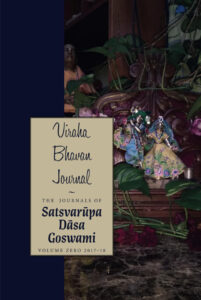
Viraha Bhavan Journal (2017–2018) was written by Satsvarūpa Mahārāja following a brief hiatus in writing activity, and was originally intended to be volume 1 in a series of published journals. However, following its completion and publication, Mahārāja again stopped writing books, subsequently focusing only on what became his current online journal, which began in August of 2018.
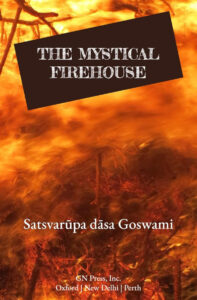
At first, I took it hard that I would have to live surrounded by the firemen, and without my own solitude. After all, for decades I had lived in my own house with my own books and my own friends. I was also now a crippled person who couldn’t walk, living among men who did active duties. But when Baladeva explained it to me, how it was not so bad living continually with other firemen and living in the firehouse with its limited facilities, I came to partially accept it and to accept the other men. I came to accept my new situation. I would live continually in the firehouse and mostly not go outside. I would not lead such a solitary life but associate with the other firemen.
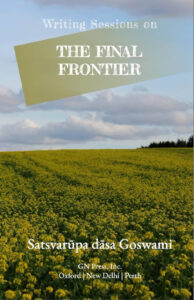
Let me write sweet prose.
Let me write not for my own benefit
but for the pleasure of Their Lordships.
Let me please Kṛṣṇa,
that’s my only wish.
May Kṛṣṇa be pleased with me,
that’s my only hope and desire.
May Kṛṣṇa give me His blessings:
Kṛṣṇa Kṛṣṇa Kṛṣṇa Kṛṣṇa Kṛṣṇa he
Rāma Rāghava Rāma Rāghava
Rāma Rāghava rakṣa mām.
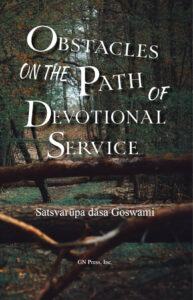
You mentioned that your pathway has become filled with stumbling blocks, but there are no stumbling blocks. I can kick out all those stumbling blocks immediately, provided you accept my guidance. With one stroke of my kick, I can kick out all stumbling blocks. —Letter by Śrīla Prabhupāda, December 9, 1972.
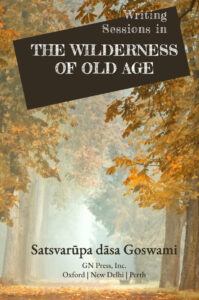
The Writing Sessions are my heart and soul. I’m trying my best to keep up with them. I am working with a few devotees, and they are far ahead of me. I wander in the wilderness of old age. I make my Writing Sessions as best I can. Every day I try to come up with a new subject. Today I am thinking of my parents. But I don’t think of them deeply. They are long gone from my life. Śrīla Prabhupāda wrote a poem when he was a sannyāsī, and he said now all my friends and relatives are gone. They are just a list of names now. I am like that too. I am a sannyāsī with a few friends. I love the books of Śrīla Prabhupāda. I try to keep up with them. I read as much as I can and then listen to his bhajanas.
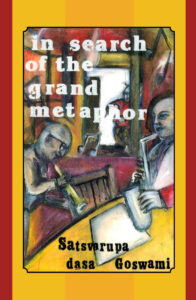
The metaphor is song. Explain it. Yes, particulars may not seem interesting or profound to readers who want structured books.
Wait a minute. Don’t pander to readers or concepts of Art. But Kṛṣṇa conscious criteria are important and must be followed. So, if your little splayed-out life-thoughts are all Kṛṣṇa conscious, then it’s no problem.
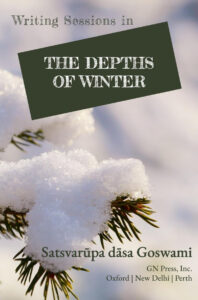
I am near the end of my days. But I do like the company of like-minded souls, especially those who are Kṛṣṇa conscious. Yes! I am prone to Kṛṣṇa consciousness. I have been a disciple of Bhaktivedanta Swami Prabhupāda for maybe almost sixty years. Sometimes I fail him. But I always bounce back and fall at his feet. It is a terrible thing that I sometimes do not have the highest love for him. It is a terrible thing. Actually, however, I never fall away from him. He always comes and catches me and brings me back to his loving arms.

This edition of Satsvarūpa dāsa Goswami’s 1996 timed book, Upstate: Room to Write, is published as part of a legacy project to restore Satsvarūpa Mahārāja’s writings to ‘in print’ status and make them globally available for current and future readers.
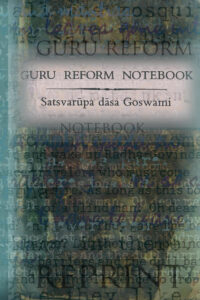
A factual record of the reform and change in ISKCON guru system of mid ’80s.

Readers will find, in the Appendix of this book, scans of a cover letter written by Satsvarūpa Mahārāja to the GN Press typist at the time, along with some of the original handwritten pages of June Bug. Together, these help to illustrate the process used by Mahārāja when writing his books during this period. These were timed books, in the sense that a distinct time period was allotted for the writing, during SDG’s travels as a visiting sannyāsī
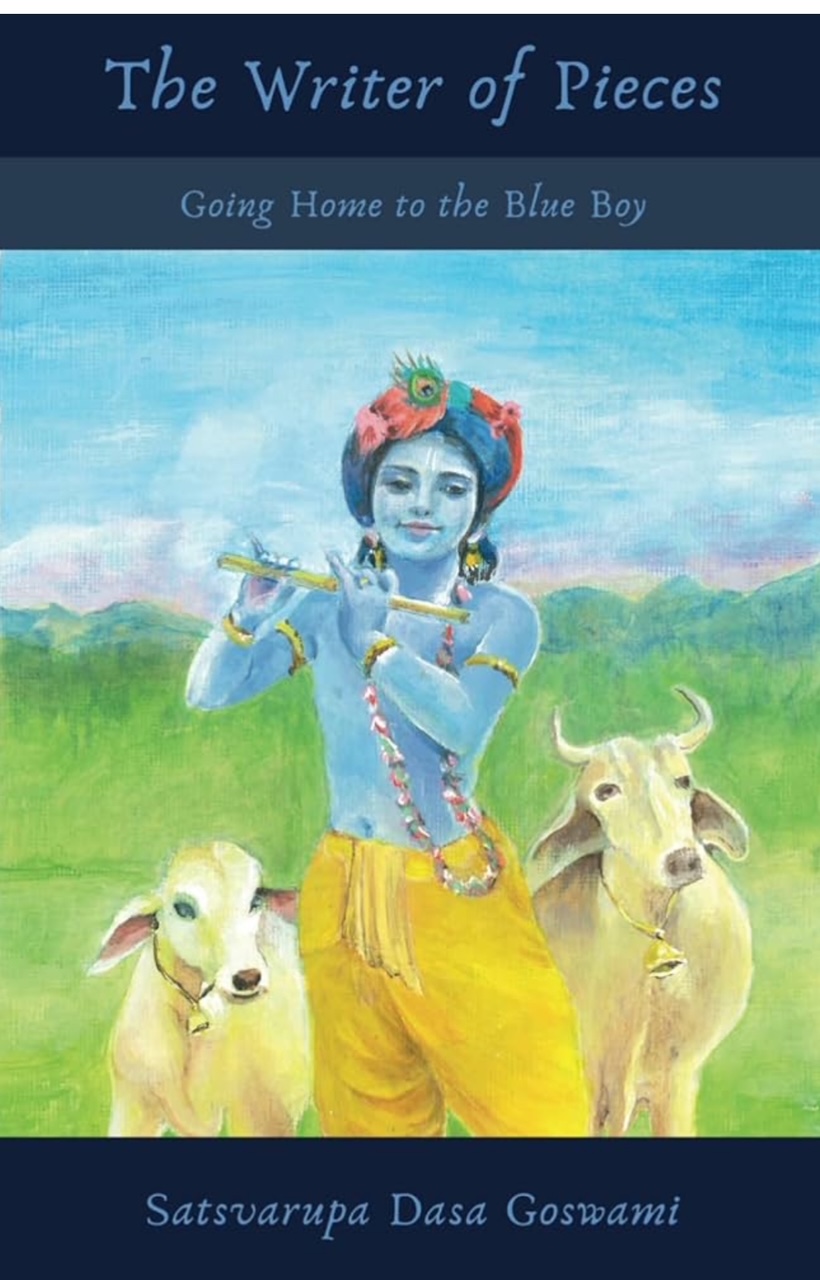
Don’t take my pieces away from me. I need them dearly. My pieces are my prayers to Kṛṣṇa. He wants me to have them, this is my way to love Him. Never take my pieces away.
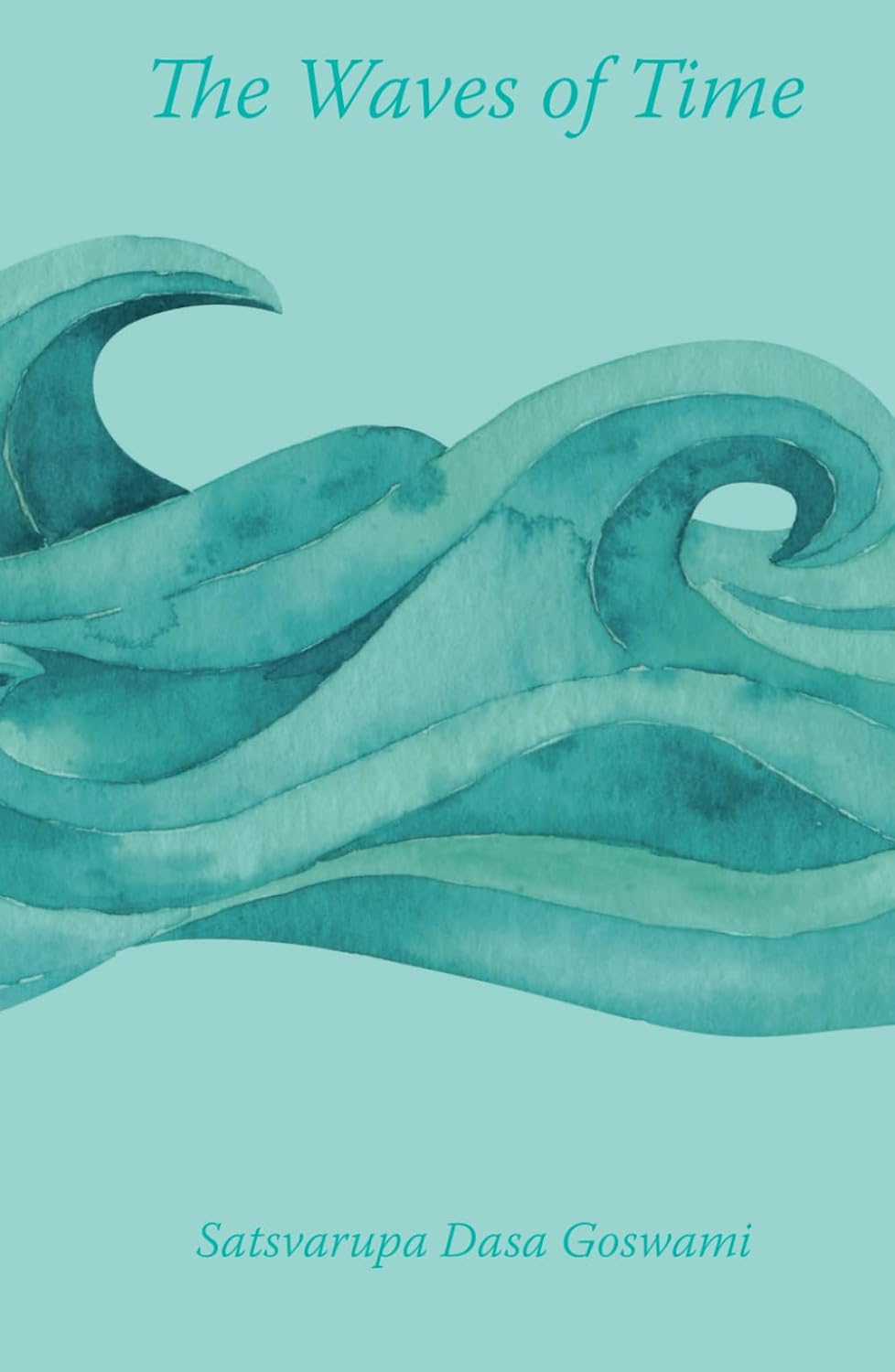
Many planks and sticks, unable to stay together, are carried away by the force of a river’s waves. Similarly, although we are intimately related with friends and family members, we are unable to stay together because of our varied past deeds and the waves of time.

To Śrīla Prabhupāda, who encouraged his devotees (including me) To write articles and books about Kṛṣṇa Consciousness.
I wrote him personally and asked if it was alright for his disciples to write books, Since he, our spiritual master, was already doing that. He wrote back and said that it was certainly alright For us to produce books.

I have a personal story to tell. It is a about a time (January–July 1974) I spent as a personal servant and secretary of my spiritual master, His Divine Grace A.C. Bhaktivedanta Swami Prabhupäda, founder-äcärya of the International Society for Krishna Consciousness. Although I have written extensively about Çréla Prabhupäda, I’ve hesitated to give this account, for fear it would expose me as a poor disciple. But now I’m going ahead, confident that the truth will purify both my readers and myself.

First published by The Gītā-nāgarī Press/GN Press in serialized form in the magazine Among Friends between 1996 and 2001, Best Use of a Bad Bargain is collected here for the first time in this new edition. This volume also contains essays written by Satsvarūpa dāsa Goswami for the occasional periodical, Hope This Meets You in Good Health, between 1994 and 2002, published by the ISKCON Health and Welfare Ministry.

This book has two purposes: to arouse our transcendental feelings of separation from a great personality, Śrīla Prabhupāda, and to encourage all sincere seekers of the Absolute Truth to go forward like an army under the banner of His Divine Grace A.C. Bhaktivedanta Swami Prabhupāda and the Kṛṣṇa consciousness movement.

A single volume collection of the Nimai novels.

Śrīla Prabhupāda was in the disciplic succession from the Brahmā-Mādhva-Gauḍīya sampradāya, the Vaiṣṇavas who advocate pure devotion to God and who understand Kṛṣṇa as the Supreme Personality of Godhead. He always described himself as simply a messenger who carried the paramparā teachings of his spiritual master and Lord Kṛṣṇa.

Dear Srila Prabhupada,
Please accept this or it’s worse than useless.
You have given me spiritual life
and so my time is yours.
You want me to be happy in Krishna consciousness
You want me to spread Krishna consciousness,

This collection of Satsvarūpa dāsa Goswami’s writings is comprised of essays that were originally published in Back to Godhead magazine between 1966 and 1978, and compiled in 1979 by Gita Nagari Press as the volume A Handbook for Kṛṣṇa Consciousness.

This second volume of Satsvarūpa dāsa Goswami’s Back to Godhead essays encompasses the last 11 years of his 20-year tenure as Editor-in-Chief of Back to Godhead magazine. The essays in this book consist mostly of SDG’s ‘Notes from the Editor’ column, which was typically featured towards the end of each issue starting in 1978 and running until Mahārāja retired from his duties as editor in 1989.

This collection of Satsvarupa dasa Goswami’s writings is comprised of essays that were originally published in Back to Godhead magazine between 1991 and 2002, picking up where Volume 2 leaves off. The volume is supplemented by essays about devotional service from issues of Satsvarupa dasa Goswami’s magazine, Among Friends, published in the 1990s.

“This is a different kind of book, written in my old age, observing Kṛṣṇa consciousness and assessing myself. I believe it fits under the category of ‘Literature in pursuance of the Vedic version.’ It is autobiography, from a Western-raised man, who has been transformed into a devotee of Kṛṣṇa by Śrīla Prabhupāda.”
 The Best I Could Do
The Best I Could DoI want to study this evolution of my art, my writing. I want to see what changed from the book In Search of the Grand Metaphor to the next book, The Last Days of the Year.
 a Hare Krishna Man
a Hare Krishna ManIt’s world enlightenment day
And devotees are giving out books
By milk of kindness, read one page
And your life can become perfect.
 Calling Out to Srila Prabhupada: Poems and Prayers
Calling Out to Srila Prabhupada: Poems and PrayersO Prabhupāda, whose purports are wonderfully clear, having been gathered from what was taught by the previous ācāryas and made all new; O Prabhupāda, who is always sober to expose the material illusion and blissful in knowledge of Kṛṣṇa, may we carefully read your Bhaktivedanta purports.

I use free-writing in my devotional service as part of my sādhana. It is a way for me to enter those realms of myself where only honesty matters; free-writing enables me to reach deeper levels of realization by my repeated attempt to “tell the truth quickly.” Free-writing takes me past polished prose. It takes me past literary effect. It takes me past the need to present something and allows me to just get down and say it. From the viewpoint of a writer, this dropping of all pretense is desirable.
 Geaglum Free Write
Geaglum Free WriteThis edition of Satsvarūpa dāsa Goswami’s 1996 timed book, Geaglum Free Write Diary, is published as part of a legacy project to restore Satsvarūpa Mahārāja’s writings to ‘in print’ status and make them globally available for current and future readers.